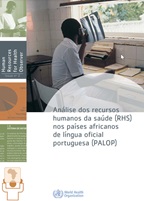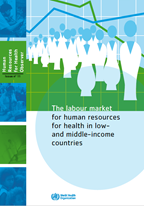People
Health labour market and partnerships
Analysing the health labour market is essential to achieve a better understanding of the forces that drive health worker shortages and surpluses, skills mix and geographical imbalances and suboptimal performance, and to develop effective policies to address these issues.
To that end, the Health Labour Market team develops guidance and technical products related to health labour market analysis and is conducting health labour market analyses in countries together with colleagues from WHO regions and WHO country offices.
A well conducted health labour market analysis is critical to providing reliable information on the main dimensions of the health workforce, notably in terms of availability, accessibility, acceptability and quality. Health labour market analysis is not an end on its own but a crucial element in health workforce policy development and is instrumental in answering important policy questions related to health workforce.
Publications
Health workforce and labour market dynamics in OECD high-income countries: a synthesis of recent analyses...
The backbone of any health-care system is the human resources who deliver care. Thus, human resources for health (HRH) planning has a direct impact on...
The health workforce in India
This study on the health workforce is based on data at district level from the Indian census of 2001. The census of India 2001 canvassed information on...
How to recruit and retain health workers in underserved areas: the Senegalese experience
In recent years, the Ministry of Health has spearheaded various measures to improve the posting process and the recruitment and retention of...

The report provides available data on the health workforce in Portuguese speaking countries (PALOP). Its purpose is to support the responsible staff and...
Technical documents

The labour market for human resources for health in low- and middle-income countries (Human Resources...
All low- and middle-income countries (LMIC) have health worker labour markets. Some of these countries’ markets function better than others and all...
External publications
Health workforce supply, needs and financial feasibility in Lesotho: a labour market analysis
Increasing the availability of health workers in rural sub-Saharan Africa: a scoping review of rural pipeline programmes
Investing in human resources for health: the need for a paradigm shift
Related teams
Multimedia
Tools
Our work in countries
Resolution WHA69.19 on the Global Strategy on Human Resources for Health: Workforce 2030, adopted by the 69th World Health Assembly in May 2016 includes three key actions related to assessing the health workforce implications of health policy and programmes:
- Development partners, including bilateral partners and multilateral aid mechanisms, will augment, coordinate and align their investments in education, employment, health, gender and labour in support of domestic financing aimed at addressing national health workforce priorities
- Global health initiatives will ensure that all grants include an assessment of health workforce implications, leverage national coordination and leadership, and contribute to efficient investment in and effective implementation of national health workforce policies
- An assessment of the health workforce implications will be made for technical resolutions brought before the World Health Assembly and WHO regional committees.
This section presents health workforce impact assessments for technical documents that have been submitted for discussion by the Executive Board and World Health Assembly.
72nd World Health Assembly
Roadmap on access to medicines, vaccines and health products 2019–2023
72nd World Health Assembly, May 2019
